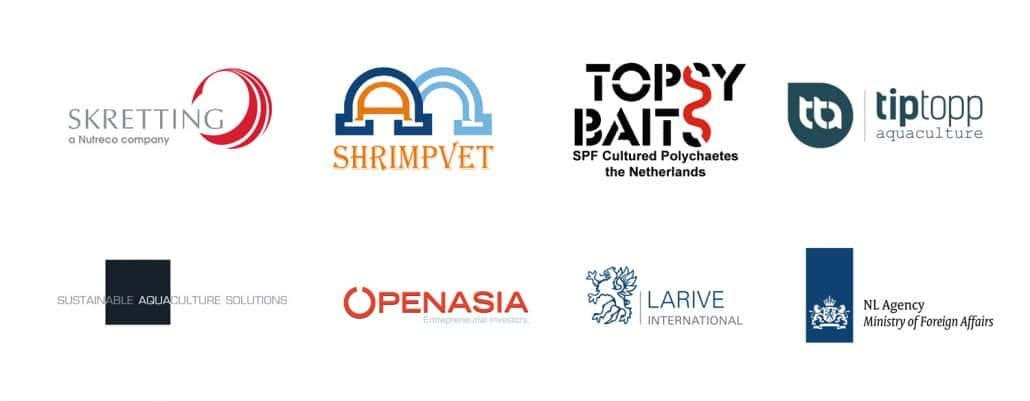Sustainable certified shrimp production in Vietnam
- Region: Vietnam
- Sector: Aquaculture (Shrimp)
- Duration: 2018-2020
- 8 Project partners
- Public-private partnership co-financed by the Dutch government
On March 11 April 2019, a new Impact Cluster collaboration, ShrimpTechVietnam, was signed by Marjolijn Sonnema, Director-General Agriculture of the Ministry of Agriculture, Nature and Food Quality and a consortium of Dutch companies who all identified specific opportunities in the shrimp sector in Vietnam.
Key Achievements
- Trained Vietnamese shrimp farmers in sustainable practices.
- Offered alternatives for antibiotics and wastewater treatment in shrimp farming.
- Demonstrated best practices for sustainable shrimp cultivation.
- Promoted responsible disease prevention and management.
- Supported Vietnamese shrimp farmers in achieving international quality standards.
Vietnamese shrimp sector
Vietnam is the world’s 2nd largest exporter of shrimp. According to the Vietnam Association of Seafood Exporters and Producers (Vasep), the Netherlands is the 2nd largest importer of Vietnamese shrimp within the EU.
About 95% of all Black Tiger shrimps (Monodon) produced in Vietnam are farmed in the Mekong Delta. Additionally, the Mekong Delta is also the farming hub for the Pacific White Shrimp (Vannamei), accounting for 75% of the total Vietnamese production. The total shrimp production in Vietnam is estimated at 650,000 tons a year.
The rapid growth of the shrimp cultivation sector in Vietnam causes a variety of issues, constraining sector development:
- The disease rate increased due to the arrival of improper intensive farming systems (e.g. without water treatment).
- Due to the high demand for shrimp, farmers are struggling to keep up in a sustainable way, which often results in shrimp that are highly contaminated with antibiotics and other chemicals. Next to that, it results in lower-quality shrimp (size, flavour, etc.).
- The lower quality of the shrimp also affects the export value of Vietnamese shrimp. Several shipments of Vietnamese shrimp have been denied in different countries (including the Netherlands) due to the presence of high levels of antibiotics.
- The current manner of highly intensive shrimp cultivation is also causing considerable damage to the environment, especially in the Mekong Delta. Over the past decades, more than half of Vietnam’s natural mangrove forests have been cleared to accommodate shrimp ponds. Additionally, intensive monocultures, poor farming practices and inappropriate water infrastructures cause water quality problems and bring a high risk of disease as chemicals and antibiotics pollute the environment.
The root of all these problems is the current practices of unsustainable and harmful high-intensive shrimp farming and the ineffective and unsustainable methods of small- and medium-sized farmers. Shrimp farmers have little to no access to the best sustainable shrimp farming practices. Furthermore, farmers are not aware of the current issues that are underlying the bigger picture concerning market developments and water and soil management (especially in the Mekong Delta).
ShrimpTechVietnam
The consortium “ShrimpTechVietnam” aims to sustainably improve the current shrimp farming practices in the Mekong Delta by conducting research, offering alternatives for antibiotics and wastewater treatment, demonstrating best practices and sustainable solutions, and training local farmers. The goal is to enable Vietnamese shrimp farmers to increase their production sustainably.
Partners
The Impact cluster contains the following sector experts:
- Topsy Baits is the biggest producer of live bait maturation feed for aquaculture industries.
- Shrimpvet is an expert company in diagnostic services, health status of shrimp, grow-out, broodstock and monitoring services.
- TipTopp Aquaculture B.V. develops and offers probiotics as a water treatment solution and an alternative to antibiotics. The TipTopp team also has extensive experience in designing, engineering and maintaining sustainable ecological shrimp cultivation techniques while increasing productivity.
- Sustainable Aquaculture Solutions (SAS) specialises in both shrimp health and disease prevention management as well as guidance and auditing for ascertaining international quality standards, providing the shrimp producers support in closing the gap with market requirements.
- Nutreco (Skretting) has a local aquafeed production facility in Vietnam and has extensive experience with regard to shrimp nutrition and health.
- Larive International and Openasia will take on the role of general project management (both local and international) and act as the liaison between the parties as well as the Dutch Government.

This project was developed at the request of the Royal Dutch Embassy in Hanoi in close cooperation with RVO, the Dutch Enterprise Agency based in the Hague. The duration of the project is 3 years (2018 – 2020).
For more info, please contact Wouter van Vliet.